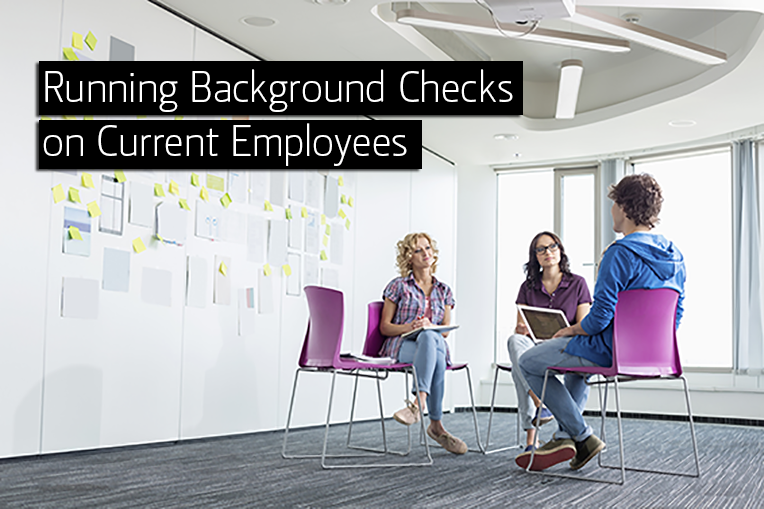Running Background Checks on Current Employees

Running a background check on new hires is a common HR practice. Applicants recognize that their criminal backgrounds, credit history, driving records and professional experience (among other things) could possibly be a deterrent to a job offer. Employees currently working for an organization, however, may not expect a background check from their employer. While not a common practice across all industries, we are asked the question with some regularity and thought we should address it.
Should an employer consider running background checks on current employees?
Why Screen Current Employees?
Once a job seeker has landed a job, they get on with their life. If they've been working for the same company for years or decades, they may assume that anything they do in their personal life will not affect their professional lives. Here are some valid reasons for conducting regular employee background checks:
- Security - if the employer feels that their employee is putting others at risk, a current and updated background check may be necessary to determine if there is criminal activity outside the workplace.
- Job performance - if the employee's job performance is suffering, an employer may wish to gather more information about current personal activities.
- Damage to the business - if the business could suffer due to suspected ongoing criminal activity, an employer may wish to inquire about crimes committed by the employee.
- Insurance underwriting - In order for employers to maintain their policy, many carriers will require annual Driver License (MVR) checks on employees operating company vehicles (or driving on company time).
Is screening current employees a good idea?
With the reasons stated above, many employers are turning to a rolling background check policy. An employer must determine if checking current employees is worth the potential risks of losing a great employee. Other things to consider are:
- discrimination if only a certain segment of the workforce is screened where others are not
- the cost of ongoing background checks
- the findings may or may not be relatable to job performance
- the findings may be beyond a 7 year reporting limitation and unable to be used for termination evidence.
Obtaining Consent for Background Checks
Just as a job candidate is required to sign a consent to a background check, so are current employees. An employer may feel that asking current employees could damage the employer-employee relationship. A current employee may feel that if his or her personal life isn't affecting their job, they shouldn't be subjected to a background check.
Technically, if an employee signed a consent to a background check upon hiring with the organization, the language is such that the consent is indefinite. An employee may revoke the consent, however, and in some states, consent is required every time there is a background check. In many cases, an employee was never screened initially and needs to sign a consent form to be screened now.
If an organization is going to run ongoing background checks on its employees, a best practice is to make this known from the initial hire date of the employee. Set a policy where every employee will be subjected to a new background screening every 5 years or so. In this way, the employee understands that this is a common practice at the organization.
It is best to make the consent to screen a positive experience for the employee. As an employer, it may help to explain that current background checks ensure the safety and security of every employee. You can find sample consent and release forms here: Employee Consent to a Background Check.
 Post-Screening: Next Steps
Post-Screening: Next Steps
As a hiring policy explicitly lists reasons for adverse action or denial of employment, a termination policy should also be established and available. If information is revealed that could lead to termination, just as with the hiring process, the employee should be given the information and allowed time to dispute the findings before any adverse action is taken. Some databases could reveal false positives or false negatives so there is always the possibility that the employee's background check is not trustworthy information.
At a minimum, any decision must be based upon some relevancy to the business. Take into consideration the nature and gravity of the offense, the nature of the job and how long ago it occurred.
Examples of workplace violence may be reason alone to conduct periodic criminal background checks on current employees. If the employee puts others or the business at risk or could potentially cause harm if not fully engaged in their job - such as the case with healthcare, transportation, finances, or law enforcement - periodic background checks may be a good policy for an organization.
If you would like more information about establishing a job related background check policy, download a copy of our complimentary screening policy ebook:
Share this
You May Also Like
These Related Stories

Can Employers Look at a Job Candidate's Credit Report?

Can an Employer Run a Background Check after Hiring?

